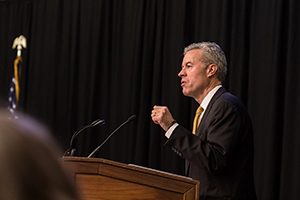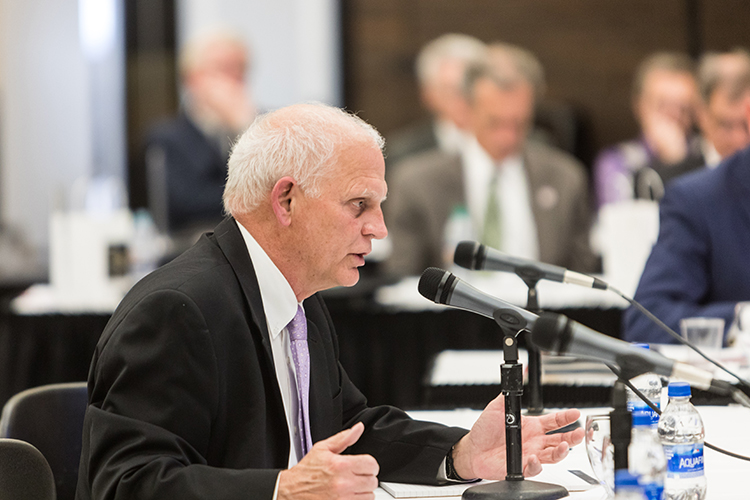University of Wisconsin System institutions are collaborating to create a systemwide undergraduate program in freshwater studies, what officials described as a one-of-a-kind effort that will focus on Wisconsin’s water issues while helping to fill a global and regional need for more workers in what is expected to be a growing field.
UWM Chancellor Mark Mone, along with leaders from other institutions, unveiled goals for the Freshwater Collaborative of Wisconsin at a Board of Regents meeting at UWM on Thursday. While UWM is leading the initiative, all 13 system members are involved in what Mone described as an unprecedented effort for the universities.
“The unifying theme that water brings to this system is pretty remarkable,” Mone said.

The collaborative focuses on what Mone called “10 grand challenges” in freshwater studies, including agricultural water management, Great Lakes restoration, as well water business and finance.
The degree program would cover multiple disciplines and give students the flexibility to focus their studies while also creating rigorous core requirements. Researchers would collaborate from across the system. System institutions would lead an effort to make Wisconsin a training destination.
“This is a great opportunity for this system to lead in a global talent issue,” UW-Green Bay Chancellor Gary Miller said in formally presenting the initiative with Mone and UW-Superior Chancellor Renee Wachter.
Wisconsin borders the Mississippi River, the longest river in North America, as well as two of the five Great Lakes, which is the largest freshwater system on the planet.
“When you look at the sheer number of water-focused, scientific assets in this state, it truly is unprecedented,” Wachter said. Working together across the system means that “we can make real progress on real solutions much faster than we can operating by ourselves.”
Regents passed a non-binding resolution expressing support to the Wisconsin Legislature for the Freshwater Collaborative, which would require $27.6 million in ongoing state support phased in over three budget cycles. By 2025, the collaborative will include 1,000 new undergraduate students studying water science; 400 new graduate research students; 100 new faculty, researchers and water professionals; and a total of 650 new jobs.
Mone stresses need for investment in UWM
In another presentation, Mone told regents that funding UWM’s proposed budget will help fill the university’s most critical needs, including retaining faculty and supporting capital improvements, at a time when the institution was “doing a tremendous amount with fewer resources.”
Mone said re-investment would help the university address the needs of southeastern Wisconsin and the rest of the state. Describing UWM as at a crossroads, the chancellor showed regents fresh evidence of a commitment to creating collaborative solutions to help address issues in areas including health care, entrepreneurship, workforce development and narrowing achievement gaps in education.
“We have and we feel – it’s in our DNA – a unique mission, and it’s about a commitment to serve,” Mone said.
Further investment in UWM amounted to an investment for the state in a university with a dual mission to provide access to education and produce top-flight research, Mone said.
“We’re so grateful for your support – unanimous support – you’ve provided for our budget, for our needs,” he told regents. “We need to be persistent … we need to continue through the entire budget cycle.”
Mone, whose presentation was interrupted for five minutes by an errant fire alarm, received a standing ovation from regents before taking questions.
Need for renovation
Robin Van Harpen, UWM’s vice chancellor for business and administrative affairs, told regents that the university was husbanding its resources well, but that capital investment was crucial.
Enrollment in STEM fields at UWM has grown 30% over the past 10 years as jobs in the field expand, Van Harpen told members of the Capital Planning Committee. That increase and the continued growth in enrollments in science, technology, engineering and mathematics make UWM’s long-range plan to replace and renovate four STEM buildings in the southwest corner of campus vitally important, she said.
A key priority is the Chemistry Building, the top major project request in the UW System for 2019-21. Among other concerns is that the building does not meet the modern code for wet labs. Chemistry is particularly important because it supports so many science and health majors at UWM, including engineering nursing, health sciences and biosciences, Van Harpen said.
UWM’s careful management of its finances is paying off in the reallocation of funds to several strategic priorities, despite declines in revenue and enrollment and a tuition freeze, Van Harpen told members of the Business and Finance Committee. Her presentation outlined ways the university has improved its budgeting model and the efficiency and effectiveness of operations.
One result of these efforts is an increase in money available for student success, enrollment support and financial aid. A major philanthropic campaign focused on scholarships has also contributed to student financial aid.
Another result of the reallocation of funds is a renewed focus on improving faculty compensation and retaining highly marketable faculty.







